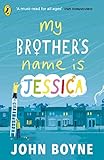
Price: £7.99
Publisher: Puffin
Genre: Fiction
Age Range: 14+ Secondary/Adult
Length: 256pp
Buy the Book
My Brother's Name is Jessica
My copy of the novel was accompanied by a reflective letter from John Boyne to his readers. In his books for younger readers, he is concerned to write about “children who are isolated in some way”. It is important, he believes, to stand up for those who are oppressed or bullied, even when offering support can prove costly. His own journey through his teens was difficult – the prospect of coming out as a gay man terrified him; but when he did so around the age of twenty, life became “a million times better”. In this novel, Jason, the idolised 17 year old brother of narrator Sam, is also very anxious as he tells his family he plans to transition. Boyne mentions talking to young transgender people while working on the story – how impressed he was by their bravery, their honesty and their recognition that people fear what they don’t understand.
My Brother’s Name is Jessica isn’t quite the book readers of Boyne’s letter might expect. He has a sharp talent for satire and for much of the narrative the parents of Jason and Sam are treated with comic mockery. This is no ordinary family. Mum is a Cabinet Minister and the top job is almost within her grasp; Dad is her private secretary, ensuring the family’s lives are shaped by Mum’s drive to No.10. So when Jason – an outstanding footballer – turns down a chance to sign for Arsenal because he doesn’t want soccer to absorb all his time, Dad’s reaction is: “It would look very good for your Mum if you were signed to a professional club”. Mum looks up briefly from filing her nails and observes, “You’re selfish. You only ever think about yourself”.
These parents are close to caricature, as parents so often used to be in fiction for young readers. Mum’s concerned that a mixed-race family moving in nearby will damage her political image as well as bring down property values. She is also implausibly stupid; although Britain is in a period of anti-EU sentiment, she has to enquire, “Is the Czech Republic in the EU?” The parents will surely amuse readers, as will Mum’s sister, Aunt Rose, who is a kind of ultra-Green, late Sixties hippy, never seen with the same colour hair twice. So far, she has traded in three husbands, as well as her polluting car which she’s swapped for an elderly horse called Bertie Wooster. She is absolutely on Jason’s side and warmly empathetic towards young Sam too.
These broad-brush characters work fine as comedy; maybe they will persuade readers that they should not be taking this novel too literally. The problem comes with Boyne’s treatment of Jason and Sam as they make their complex journeys through the plot. Sam, who struggles with dyslexia, is vulnerable at school, finding it difficult to make friends until he meets Laura, the daughter of Mum’s rival for the leadership of her party. Boyne creates an engaging, hesitant tenderness between them. Jason/Jessica and Sam are convincingly aware and subtle in their affection and care for each other, even as they negotiate misunderstandings and anxieties – their relationship is so nuanced that they seem not to belong in the same book as their parents. Boyne writes about them in a different register, without comic exaggeration. Inevitably this contrast diminishes the seriousness of Boyne’s exploration of transgendering.
In the later chapters, things change. As the news of Jason’s transitioning becomes public, Mum and Dad confront their own failure to listen and support; they become the concerned parents they might have been if not blinded by political ambition. There are, of course, consequences still to be played out….



